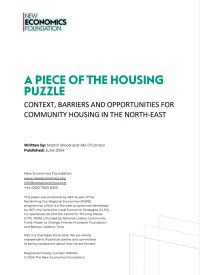Publications A piece of the housing puzzle Context, barriers and opportunities for community housing in the north-east By Martin Wood, Abi O'Connor 20 June 2024 Download the report Over the last century, various models of community housing – co-operatives, self-build associations, community land trusts – have arisen at different stages, with peaks and troughs in the levels of activity. Given the current extreme pressure on safe and affordable homes, community
Topics:
New Economics Foundation considers the following as important:
This could be interesting, too:
Robert Vienneau writes Austrian Capital Theory And Triple-Switching In The Corn-Tractor Model
Mike Norman writes The Accursed Tariffs — NeilW
Mike Norman writes IRS has agreed to share migrants’ tax information with ICE
Mike Norman writes Trump’s “Liberation Day”: Another PR Gag, or Global Reorientation Turning Point? — Simplicius
A piece of the housing puzzle
Context, barriers and opportunities for community housing in the north-east
20 June 2024
Over the last century, various models of community housing – co-operatives, self-build associations, community land trusts – have arisen at different stages, with peaks and troughs in the levels of activity. Given the current extreme pressure on safe and affordable homes, community provision of housing is now re-emerging as an option for communities across the country. The existence of community-led housing should not be considered as an alternative to mass building of social homes. However, it is important to see this community activity as part of a response to England’s housing crisis. A significant decline in the social housing sector since the early 1980s, and theongoingright to buy, has continued to removeaffordable, secure, and accessible housing options. Over the same time, private rents have increased well above inflation while23% ofprivate renters live in poor quality and poorly insulated homes. Currently, at least 8.5 million people are in acute housing need, with record numbers on social housing waiting lists, in temporary accommodation, and experiencing homelessness.
The intensity of the housing crisis and the need for locally led responses is an issue which drives support for increased devolution. In March 2024, the leaders of the seven local authorities that make up the new North East Combined Authority (NECA), signed a trailblazer devolutiondeal with the central government giving them wide-ranging powers, including over housing.iv In the context of the newly established mayoralty, identifying how and where support can be offered for community-based initiatives that deliver better outcomes than the existing housing provision is important. As such, this report, part of the broader Reclaiming Our Regional Economies (RORE) programme, offers understanding of community-led housing solutions at a local level which can meet local needs. This is timely, as the north-east’s experience of the housing crisis is worsening rapidly. In 2023, the highest number of residents in a decade were on the social housing waiting list, increasing by over 50% on average since 2022. In Sunderland specifically, this increase was a staggering 523%.
Drawing on the lived experience of those involved in community housing initiatives, we found that whilst current community housing activity is small, there is an appetite for community housing in the north-east. However, this report shows that significant barriers exist which prevent community housing projects offering long-term sustainable alternatives to existing housing tenures. Most significantly, financial instability pervades the sector, with the lack of secure funding for housing projects curtailing their success and longevity. Relatedly, the small scale of community housing initiatives and the current inability to expand due to funding and capacity were evidenced as significant barrier. That said, key themes also emerged which show how the sector can work more effectively to achieve housing equity and the motivations for this. These centre on collaboration, sharing best practice and addressing the inequalities which permeate both community organisations and access to safe, secure and affordable housing.
This report addresses a gap in understanding of the potential role that community housing can play in the north-east. Crucially, our findings identify key policy levers that the central government can use to elicit positive change at both combined and local authority levels. From here we developed a comprehensive set of recommendations targeting stakeholders at different institutional scales, which will support the expansion and longevity of the sector. In doing so, this research identifies some potential solutions to localised housing stress.
Topics Housing & land Local economies




